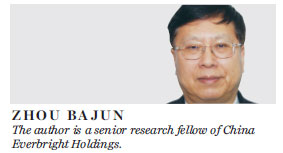Signs are emerging the SAR's economy may be slowing down
Updated: 2015-08-26 09:33
By Zhou Bajun(HK Edition)
|
|||||||
The SAR government announced on Aug 14 that Hong Kong's economy grew by 2.8 percent in the second quarter (Q2). Because the Q2 result was better than expected the government felt optimistic enough to adjust the forecast of annual growth from 1-3 percent in May to 2-3 percent. However, some people apparently do not share the government's optimism. They even warned that Hong Kong's economy could be headed for slowdown.
Granted, only time will tell who is right, but there is no denying correct prediction of economic prospects is very important for businesses and even more so for the government.
One should be able to see there are some obvious signs that Hong Kong's economy may be slowing down this year. The first such sign is the slumping tourist industry. The number of tourist arrivals in July registered an 8.4 percent drop year-on-year, the largest fall in recent years. Among the main sources of visitors, the mainland led the field with a nearly 10 percent fall from last year, while overseas sources together posted a 3 percent drop.
The decline in tourist arrivals has seriously hurt the retail sector with luxury stores suffering a significant sales slump. On Queen's Road Central, regarded as the heart of the consumer district from Central to Wan Chai, some luxury brands have already taken steps to avoid a further erosion in earnings. For example, US accessory maker Coach ended the lease for its Central flagship store two years before it expires. Some industry insiders predicted more shops will join the stampede later this year. This may cause a 10 percent fall in the rental rates of roadside shopping spaces in the district.
Another important sign of economic slowdown is continued stock market falls, with the Hang Seng Index having plummeted by around 25 percent from its high this year. This is prompting some pundits to conclude Hong Kong is now technically in a "bear market".
Then there is the fact that the mainland economy is feeling the pressure of weak growth. The global economy is already showing signs of deceleration. On Aug 21 Caixin published a piece of ominous news that the mainland's Purchasing Managers Index in early July reached a new low since early 2009. Sure enough, all major stock markets around the world saw widespread falls later that day. New York oil futures dropped below $40 a barrel that day, the first time since February 2009, after an eight-week downslide - the longest since 1986.
If a worldwide stock market fall is caused by currency-related fear it would not lead to an economic recession. An example of this can be found in the global stock market meltdown in October 1987. Today's stock market slump, however, is widely blamed on poor performances of leading real economies, which are also reflected in the falling prices of bulk commodities, particularly oil. These are all sure signs of real economies in trouble and should not be overlooked.
Looking at leading economies around the world, only China and a few emerging markets are doing moderately well. The US is still having a hard time recovering from the 2008 financial meltdown. Japan's economy is experiencing another slump and the European Union is struggling, on the verge of a recession, weighed down by a sovereign debt crisis which has yet to end. The governments of those leading economies have very limited means to prevent a recession.
As a small regional economy, open to global markets, Hong Kong simply cannot avoid the impact of a worldwide economic slowdown. Thanks to the linked exchange rate system, the SAR government does not have the necessary policy tools to maintain monetary independence. Under the constraint of severe financial discipline, the SAR government has little wiggle room to deal with an economic slowdown. That is why the government and business community as well as local residents must be psychologically prepared for an "economic winter".
Hong Kong is at a critical point after constitutional reform was derailed by the opposition camp, with the government attempting to "refocus" efforts on economic development and improving people's livelihoods. An economic slowdown is the last thing it wants to deal with right now.
Chief Executive Leung Chun-ying recently reiterated the SAR government will strive to be "appropriately proactive". By that he meant the government will take appropriate steps to push structural transformation and development of the economy forward. Priority is given to nurturing the scientific and technological innovation industry. For such efforts to succeed, Hong Kong should seek support from the central government.
Although the mainland is also faced with slowing economic growth, it is blessed with all the elements that make it the world's single largest economy. That means it still has a lot of room for maneuver when it comes to boosting growth by fueling domestic demand. Remember the mainland's consumers? Hong Kong needs them to shop here more than ever.

(HK Edition 08/26/2015 page10)